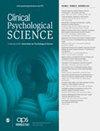父母和孩子的抑郁症状和专制父母:从幼儿到青春期的相互关系
IF 4.1
2区 医学
Q1 PSYCHIATRY
引用次数: 1
摘要
我们采用交叉滞后面板模型来检验599名社区青少年(89.1%白人,7.7%黑人/非裔美国人,2.3%亚洲人,0.7%多种族/其他;65.3%的家长中至少有一人拥有4年制大学学位)。在孩子3到15岁期间,父母完成了关于他们自己的抑郁症状和专制育儿行为的自我报告。在所有时间点,采用与发育相适应的半结构化临床访谈对儿童抑郁症状进行评估。结果表明,从3岁到15岁,母亲和儿童抑郁症状之间存在相互作用的途径。此外,虽然3岁时的儿童抑郁症状会导致3岁至15岁时父母的消极专制教育,但这些影响并不是相互的。没有观察到父亲和儿童抑郁症状之间的联系。我们的研究结果强调了检查相互途径以确定家庭中抑郁症发展机制的重要性。本文章由计算机程序翻译,如有差异,请以英文原文为准。
Parent and Child Depressive Symptoms and Authoritarian Parenting: Reciprocal Relations From Early Childhood Through Adolescence
We conducted cross-lagged panel models to examine reciprocal relations between parent and child depressive symptoms and authoritarian-parenting behaviors across development in a community sample of 599 youths (89.1% White, 7.7% Black/African American, 2.3% Asian, 0.7% multiracial/other; 65.3% had at least one parent with a 4-year college degree). Mothers and fathers completed self-report measures about their own depressive symptoms and authoritarian-parenting behaviors during the years their children were 3 to 15 years old. Child depressive symptoms were assessed with a developmentally appropriate semistructured clinical interview at all time points. Results demonstrated reciprocal pathways between maternal and child depressive symptoms from ages 3 to 15 years serial mediators. Moreover, although child depressive symptoms at age 3 years led to greater maternal and paternal negative authoritarian parenting from ages 3 to 15 years, these effects were not reciprocal. Pathways between paternal and child depressive symptoms were not observed. Our findings highlight the importance of examining reciprocal pathways to identify mechanisms in the development of depression within families.
求助全文
通过发布文献求助,成功后即可免费获取论文全文。
去求助
来源期刊

Clinical Psychological Science
Psychology-Clinical Psychology
CiteScore
9.70
自引率
2.10%
发文量
35
期刊介绍:
The Association for Psychological Science’s journal, Clinical Psychological Science, emerges from this confluence to provide readers with the best, most innovative research in clinical psychological science, giving researchers of all stripes a home for their work and a place in which to communicate with a broad audience of both clinical and other scientists.
 求助内容:
求助内容: 应助结果提醒方式:
应助结果提醒方式:


